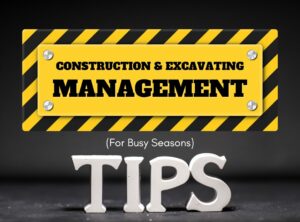For a construction company, the ebb and flow of business can often resemble the changing seasons. Just as nature experiences periods of dormancy, construction firms too have their less busy seasons. These off-seasons can be challenging, but they also present opportunities for growth, improvement, and strategic planning. In this blog, we will explore how a construction company should approach a less busy season to ensure it emerges stronger and more competitive.

Assess Your Current Position
Before diving into any action plan, it’s crucial to assess your company’s current situation. Analyze your financial health, review project pipelines, and take stock of your workforce and equipment. This evaluation will provide a clear picture of where you stand and what needs attention.
Budget and Cash Flow Management
In slower seasons, managing cash flow is paramount. Revisit your budget and make necessary adjustments to account for reduced income. Consider cutting non-essential expenses and renegotiating supplier contracts to reduce costs. It may also be wise to explore lines of credit or alternative funding sources to maintain financial stability during the off-season.
Diversify Your Services
One way to mitigate the impact of a slow season is to diversify your services. Explore new areas of expertise or complementary services that your company can offer. For instance, if you specialize in residential construction, consider branching into commercial or industrial projects. This diversification can help stabilize your revenue stream throughout the year.

Focus on Marketing and Sales
During the off-season, allocate time and resources to improve your marketing and sales efforts. Revamp your website, update your portfolio, and invest in digital marketing strategies to attract potential clients. Build relationships with local businesses, real estate agents, and other industry professionals to expand your network.
Training and Skill Enhancement
Use the less busy season as an opportunity to invest in your workforce. Offer training programs to enhance the skills of your employees or bring in new talent. This can improve your team’s capabilities and position your company for success when the busy season returns.
Maintenance and Equipment Upkeep
Neglecting equipment maintenance can lead to costly breakdowns during peak construction periods. Schedule routine maintenance and inspections for your machinery and vehicles. This not only prevents unexpected downtime but also extends the lifespan of your equipment.

Streamline Processes and Operations
The off-season is an ideal time to review and optimize your company’s processes and operations. Identify inefficiencies and bottlenecks and implement solutions to streamline workflow. Investing in project management software and adopting lean construction principles can significantly improve your efficiency.
Customer Relationship Management
Maintaining strong relationships with existing clients is essential for long-term success. Use the off-season to reach out to past clients, provide updates on your company’s activities, and inquire about their future projects. This can lead to repeat business and referrals.
Research and Innovation
Stay up-to-date with industry trends and innovations. Research new construction materials, technologies, and sustainable practices. Incorporating these advancements into your projects can give you a competitive edge when business picks up again.

Strategic Planning
Finally, use the off-season to develop a strategic plan for the coming year. Set clear goals, define your company’s vision, and outline a roadmap for achieving your objectives. Having a well-thought-out plan will guide your actions and keep your team focused.
A less busy season for a construction company need not be a time of stagnation. By approaching it strategically, you can turn this period into an opportunity for growth, improvement, and preparation for the next busy season. Assess your situation, manage your finances wisely, diversify your services, and invest in your team and equipment. With the right approach, your construction company can emerge from the off-season stronger and more competitive than ever.






